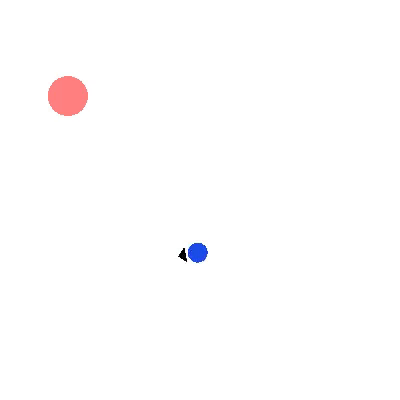Repository containing a collection of environment for reinforcement learning task possessing discrete-continuous hybrid action space.
"Moving-v0" and "Sliding-v0" are sandbox environments for parameterized action-space algorithms. The goal of the agent is to stop inside a target area.
The field is a square with a side length of 2. The target area is a circle with radius 0.1. There is three discrete actions: turn, accelerate, and break. In addition to the action, there is 2 possible complementary parameters: acceleration and rotation.
The episode terminates if one of the three condition is filled:
- the agent stop inside the target area,
- the agent leaves the field,
- the step count is higher than the limit (set by default at 200).
The moving environment doesn't take into account the conservation of inertia, while the sliding environment does. Sliding-v0 is therefore more realistic than Moving-v0.
All the parameters, actions, states and rewards are the same between the two environments. Only the underlying physics changes.
The state is constituted of a list of 10 elements. The environment related values are: the current step divided by the maximum step, and the position of the target (x and y). The player related values are the position (x and y), the speed, the direction (cosine and sine), the distance related to the target, and an indicator that becomes 1 if the player is inside the target zone.
state = [
agent.x,
agent.y,
agent.speed,
np.cos(agent.theta),
np.sin(agent.theta),
target.x,
target.y,
distance,
0 if distance > target_radius else 1,
current_step / max_step
]The reward is the distance of the agent from the target of the last step minus the current distance. There is a penalty (set by default at a low value) to incentivize the learning algorithm to score as quickly as possible. A bonus reward of one is added if the player achieve to stop inside the target area. A malus of one is applied if the step count exceed the limit or if the player leaves the field.
The action ids are:
- Accelerate
- Turn
- Break
The parameters are:
- Acceleration value
- Rotation value
There is two distinct way to format an action:
Action with all the parameters (convenient if the model output all the parameters):
action = (action_id, [acceleration_value, rotation_value])Example of a valid actions:
action = (0, [0.1, 0.4])
action = (1, [0.0, 0.2])
action = (2, [0.1, 0.3])Note: Only the parameter related to the action chosen will be used.
Action with only the parameter related to the action id (convenient for algorithms that output only the parameter of the chosen action, since it doesn't require to pad the action):
action = (0, [acceleration_value])
action = (1, [rotation_value])
action = (2, [])Example of valid actions:
action = (0, [0.1])
action = (1, [0.2])
action = (2, [])Make and initialize an environment:
import gym
import gym_parametrized
sliding_env = gym.make('Sliding-v0')
sliding_env.reset()
moving_env = gym.make('Moving-v0')
moving_env.reset()Get the action space and the observation space:
ACTION_SPACE = env.action_space[0].n
PARAMETERS_SPACE = env.action_space[1].shape[0]
OBSERVATION_SPACE = env.observation_space.shape[0]Run a random agent:
done = False
while not done:
state, reward, done, info = env.step(env.action_space.sample())
print(f'State: {state} Reward: {reward} Done: {done}')The parameter that can be modified during the initialization are:
seed(default = None)max_turn, angle in radi that can be achieved in one step (default = np.pi/2)max_acceleration, acceleration that can be achieved in one step (if the input parameter is 1) (default = 0.5)delta_t, time step of one step (default = 0.005)max_step, limit of the number of step before the end of an environment (default = 200)penalty, value substracted to the reward each step to incentivise the agent to finish the environment quicker (default = 0.001)
Initialization with custom parameters:
env = gym.make(
'Moving-v0',
seed=0,
max_turn=1,
max_acceleration=1.0,
delta_t=0.001,
max_step=500,
penalty=0.01
)Two testing files are avalaible to show users how to render and record the environment:
Even though the mechanics of the environment are done, maybe the hyperparameters will need some further adjustments.
This environment is described in several papers such as:
Parametrized Deep Q-Networks Learning, Xiong et al., 2018
Hybrid Actor-Critic Reinforcement Learning in Parameterized Action Space, Fan et al., 2019
Direct Installation from github using pip by running this command:
pip install git+https://github.com/thomashirtz/gym-hybrid#egg=gym-hybrid